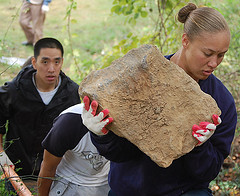Promoting civic engagement—constructive involvement in public life—involves fostering the motivation, skills, attitudes, and knowledge that people need to make meaningful contributions in their communities and the nation. When young people are provided with opportunities to become meaningfully involved in civic life, they can develop positive moral attitudes and become committed to helping others, and their self-esteem and academic achievement can also get a boost. Because young people are figuring out where they belong in society, early involvements can lay the basis for lifelong community participation.
Schools have an important role to play in cultivating civic habits. Educators across the nation aim to promote youth civic engagement—by teaching students about the political process and what it means to be a citizen, and also by sponsoring service efforts, such as volunteering in hospitals or neighborhood projects. But what occurs when civic education unfolds in ethnically and racially diverse communities? My research colleagues and I looked into these issues in a northwestern Georgia middle school and high school where most of the students are Latinos and Latinas. We learned that special steps need to be taken when designing school curricula and creating opportunities for community volunteering, because civic attitudes and skills may vary and civic education does not affect students from different backgrounds in the same way.
Ethnic Identity and Civic Engagement

Ethnic identity includes self-perceptions—a person’s sense of where he or she fits in—as well as attitudes and feelings toward other ethnic groups. Being involved in a community often depends on people first being solidly connected to others around them and feeling secure about who they are. Building on research that has established these requisites, my colleagues and I were interested in whether identifying with an ethnic group and having positive attitudes toward other groups could lead to increased civic engagement. From student responses to questionnaires, we discovered that strong ethnic identity was indeed related to more positive attitudes toward diversity and greater political awareness. In addition, strong ethnic identity was positively associated with good interpersonal and problem solving skills and effective leadership skills. Our findings suggest that encouraging youth to develop a strong ethnic identity within the school setting may make civics education and service-learning projects more meaningful and effective.
Civic Attitudes and Youth Skills
Our study found that students in the Georgia school system believe that civic involvement is important and have faith in their own readiness to be involved in their community. But there were important ethnic differences in students’ assessments of their own strengths and attitudes:
- Students who were not Latinos or Latinas reported that they had strong problem solving skills, political awareness, and leadership skills, but were less likely than the Latino and Latina students to value diversity or express concerns about social justice issues such as poverty, discrimination, or immigration rights.
- Latino and Latina students assessed themselves as having good interpersonal problem-solving skills and political awareness, and also expressed greater sensitivity to social justice concerns and more positive attitudes toward other ethnic groups.
- At the same time, Latinos and Latinas reported less confidence in their own civic skills and assessed leadership skills in an ethnically distinctive way.
Ethnically Varying Views of Leadership and Civic Responsibility
The Latino and Latina students we studied in Georgia seemed to have a distinctive understanding of what it means to be a leader. They invoked the cultural values of personalismo and simpatía—values that encourage individuals to form personal connections and take special care to assure that social interactions are harmonious. Among these students, the favored leadership style is characterized by power sharing and delegation within groups, which contrasts with American culture’s strong emphasis on individualism, self-reliance, and competition. Traditional U.S. concepts place more stress on assertive leadership by individuals in relation to groups of followers or supporters.The Latino and Latina students we studied also scored relatively low on measures of expressed desire to take action to solve community problems. Although these young people are sensitive to issues of social justice and social diversity, their sensitivities do not appear to motivate them to take action. They care but are not always inclined to act on their concerns in the community.
Beyond One-Size-Fits-All Civics Education
Our findings have important implications for designing school curricula and programs to promote civic engagement in youth. Thoughtful attention to diverse perspectives and issues of social justice can promote both strong ethnic identity and positive civic attitudes and skills.
- Educators should be aware that civic attitudes and skills may be understood differently by students from different ethnic groups, and tailor programs accordingly.
- Social justice and diversity issues must be explicitly addressed in both civic lessons and volunteer service projects. Educators should not downplay such issues just because they may be touchy or controversial.
- The finding that social justice concerns do not necessarily motivate action underlines the need to provide youth with meaningful pathways for civic engagement and leadership, along with clear and respectful feedback about the purposes and effects of their activities.
At times, adults presume that youth are not interested in or ready for effective civic engagement. Educators must start from the opposite assumption, and learn how best to encourage civic contributions from young people who come from diverse backgrounds and are in the midst of navigating their own diverse identities and places in society. Drawing out the best from everyone will make American democracy stronger for all.

 Research to Improve Policy: The Scholars Strategy Network seeks to improve public policy and strengthen democracy by organizing scholars working in America's colleges and universities. SSN's founding director is Theda Skocpol, Victor S. Thomas Professor of Government and Sociology at Harvard University.
Research to Improve Policy: The Scholars Strategy Network seeks to improve public policy and strengthen democracy by organizing scholars working in America's colleges and universities. SSN's founding director is Theda Skocpol, Victor S. Thomas Professor of Government and Sociology at Harvard University.